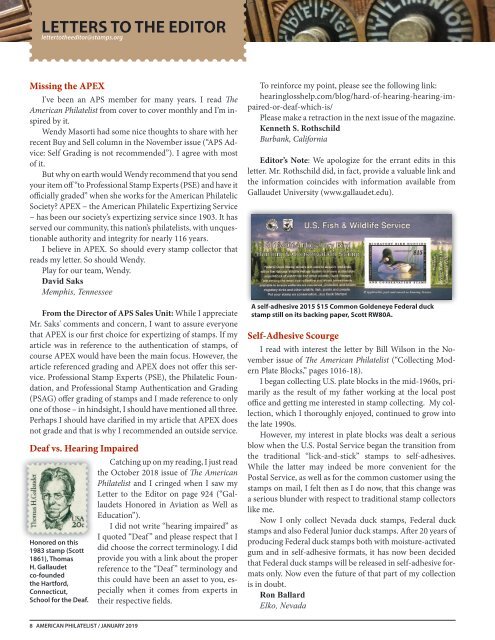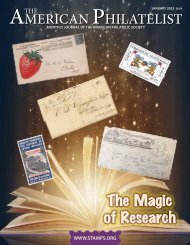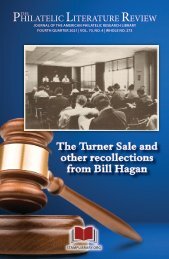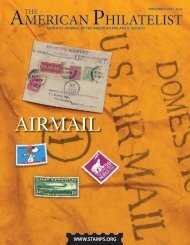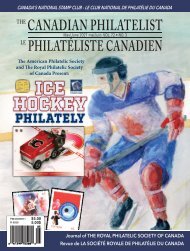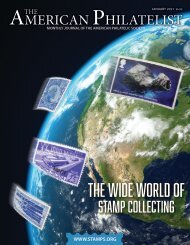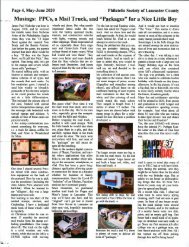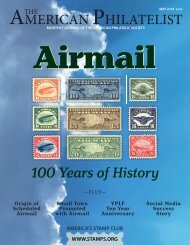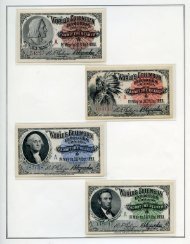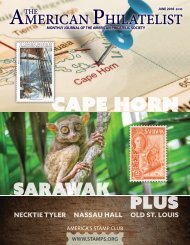January 2019
You also want an ePaper? Increase the reach of your titles
YUMPU automatically turns print PDFs into web optimized ePapers that Google loves.
LETTERS TO THE EDITOR<br />
lettertotheeditor@stamps.org<br />
Missing the APEX<br />
I've been an APS member for many years. I read The<br />
American Philatelist from cover to cover monthly and I’m inspired<br />
by it.<br />
Wendy Masorti had some nice thoughts to share with her<br />
recent Buy and Sell column in the November issue (“APS Advice:<br />
Self Grading is not recommended”). I agree with most<br />
of it.<br />
But why on earth would Wendy recommend that you send<br />
your item off “to Professional Stamp Experts (PSE) and have it<br />
officially graded” when she works for the American Philatelic<br />
Society? APEX − the American Philatelic Expertizing Service<br />
− has been our society’s expertizing service since 1903. It has<br />
served our community, this nation’s philatelists, with unquestionable<br />
authority and integrity for nearly 116 years.<br />
I believe in APEX. So should every stamp collector that<br />
reads my letter. So should Wendy.<br />
Play for our team, Wendy.<br />
David Saks<br />
Memphis, Tennessee<br />
From the Director of APS Sales Unit: While I appreciate<br />
Mr. Saks' comments and concern, I want to assure everyone<br />
that APEX is our first choice for expertizing of stamps. If my<br />
article was in reference to the authentication of stamps, of<br />
course APEX would have been the main focus. However, the<br />
article referenced grading and APEX does not offer this service.<br />
Professional Stamp Experts (PSE), the Philatelic Foundation,<br />
and Professional Stamp Authentication and Grading<br />
(PSAG) offer grading of stamps and I made reference to only<br />
one of those – in hindsight, I should have mentioned all three.<br />
Perhaps I should have clarified in my article that APEX does<br />
not grade and that is why I recommended an outside service.<br />
Deaf vs. Hearing Impaired<br />
Honored on this<br />
1983 stamp (Scott<br />
1861), Thomas<br />
H. Gallaudet<br />
co-founded<br />
the Hartford,<br />
Connecticut,<br />
School for the Deaf.<br />
Catching up on my reading, I just read<br />
the October 2018 issue of The American<br />
Philatelist and I cringed when I saw my<br />
Letter to the Editor on page 924 (“Gallaudets<br />
Honored in Aviation as Well as<br />
Education”).<br />
I did not write “hearing impaired” as<br />
I quoted “Deaf ” and please respect that I<br />
did choose the correct terminology. I did<br />
provide you with a link about the proper<br />
reference to the “Deaf ” terminology and<br />
this could have been an asset to you, especially<br />
when it comes from experts in<br />
their respective fields.<br />
To reinforce my point, please see the following link:<br />
hearinglosshelp.com/blog/hard-of-hearing-hearing-impaired-or-deaf-which-is/<br />
Please make a retraction in the next issue of the magazine.<br />
Kenneth S. Rothschild<br />
Burbank, California<br />
Editor’s Note: We apologize for the errant edits in this<br />
letter. Mr. Rothschild did, in fact, provide a valuable link and<br />
the information coincides with information available from<br />
Gallaudet University (www.gallaudet.edu).<br />
A self-adhesive 2015 $15 Common Goldeneye Federal duck<br />
stamp still on its backing paper, Scott RW80A.<br />
Self-Adhesive Scourge<br />
I read with interest the letter by Bill Wilson in the November<br />
issue of The American Philatelist (“Collecting Modern<br />
Plate Blocks,” pages 1016-18).<br />
I began collecting U.S. plate blocks in the mid-1960s, primarily<br />
as the result of my father working at the local post<br />
office and getting me interested in stamp collecting. My collection,<br />
which I thoroughly enjoyed, continued to grow into<br />
the late 1990s.<br />
However, my interest in plate blocks was dealt a serious<br />
blow when the U.S. Postal Service began the transition from<br />
the traditional “lick-and-stick” stamps to self-adhesives.<br />
While the latter may indeed be more convenient for the<br />
Postal Service, as well as for the common customer using the<br />
stamps on mail, I felt then as I do now, that this change was<br />
a serious blunder with respect to traditional stamp collectors<br />
like me.<br />
Now I only collect Nevada duck stamps, Federal duck<br />
stamps and also Federal Junior duck stamps. After 20 years of<br />
producing Federal duck stamps both with moisture-activated<br />
gum and in self-adhesive formats, it has now been decided<br />
that Federal duck stamps will be released in self-adhesive formats<br />
only. Now even the future of that part of my collection<br />
is in doubt.<br />
Ron Ballard<br />
Elko, Nevada<br />
8 AMERICAN PHILATELIST / JANUARY <strong>2019</strong>


